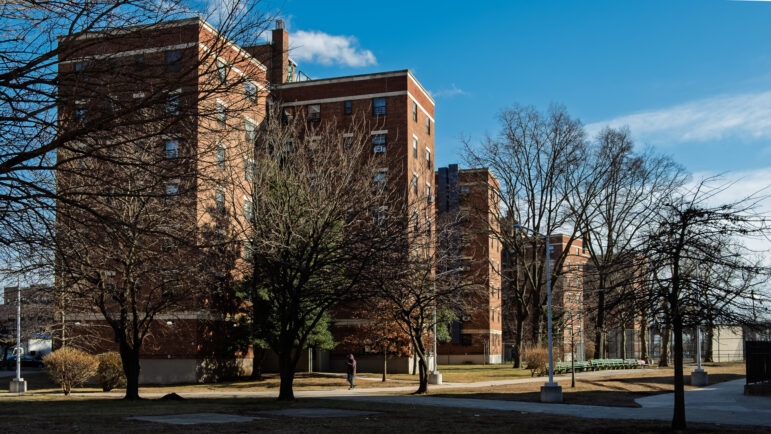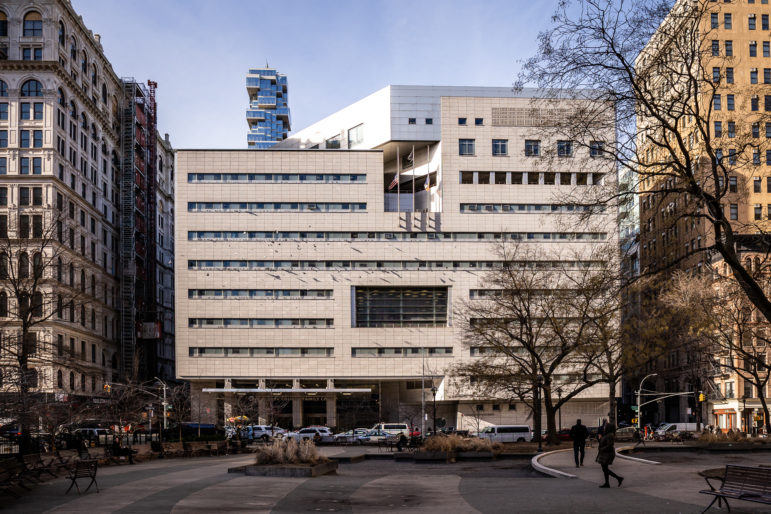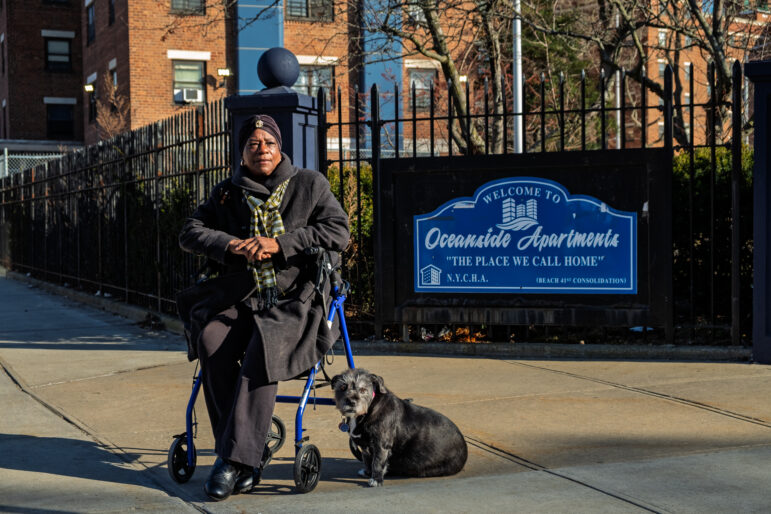“When I told them I was assigned to room 503, the staff told me it’s an office,” said Carlos, who asked that his full name not be used for fear of retaliation. “I went in and saw that there was no window. How are they going to have children in the summer in these conditions?”
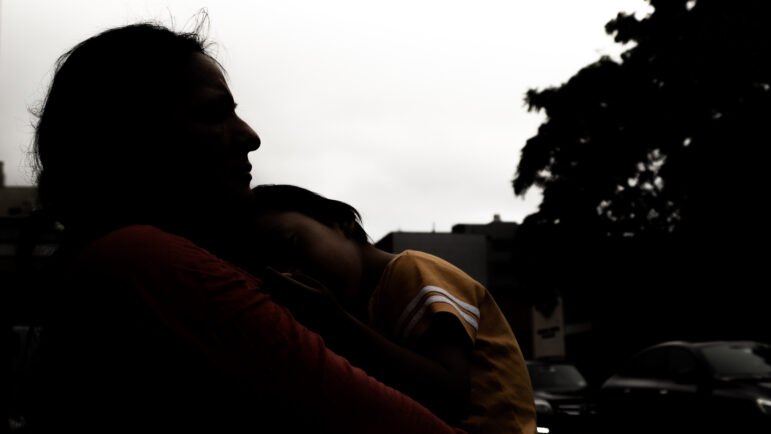
Adi Talwar
Marcia’s family was among those transferred from their Long Island City hotel room to another Thursday night. Her family’s new room was so small that the four cots put together left almost no room to walk around, she said.Lea la versión en español aquí.
Some 36 families were on the list to be moved from an emergency shelter in Long Island City on Friday. Three yellow school buses had arrived early in the morning and were waiting in front of the Queens County Inn and Suites hotel to take the families—among the tens of thousands of asylum seekers currently in the city’s care—to their new shelter assignments.
But most did not want to leave, telling City Limits the sites they were being transferred to were too small to accommodate their families, were missing beds or windows, or that they needed more time to make the move.
Among them was Mrs. Sánchez, who asked that her full name not be used for fear of jeopardizing her immigration case. She was waiting for her daughter to arrive back at the Crescent Avenue hotel on Friday afternoon from summer camp; the family had been notified of the transfer just a day before, leaving them little time to prepare. “How do you want me to leave if my daughter arrives today and I have to pick her up?” Sánchez said in Spanish.
“They [the shelter staff] know my situation,” she added, “but they tell me that I still have to leave and come back quickly to pick her up, but I’m not leaving.”
Such transfers are not unusual for people staying in New York’s sprawling shelter system, but they’ve become more complex as the city grapples to house a record-high homeless population, with 103,400 people currently under its care, including both longer-term New Yorkers and tens of thousands of new immigrants.
The Adams Administration has opened 186 permanent and temporary shelters to meet that demand, including booking hotel rooms across the five boroughs in addition to less formal lodgings, like cots set up in churches and in large tent facilities. Some sites known as respite centers—intended to offer temporary stays for adults—have lacked access to facilities like showers.
While the city has been making similar shelter-to-shelter moves for months, even facing opposition over its effort to relocate single adults from a Humanitarian Emergency Response and Relief Center (HERRC) in Manhattan to another at the Brooklyn Cruise Terminal, family transfers are not as common.
“The City is struggling to meet its legal obligations to shelter families with children at sites where they can have their own living space, as required by law,” said Joshua Goldfein, a staff attorney at the Homeless Rights Project of the Legal Aid Society, one of the organizations in charge of shelter oversight in the city. In May, Mayor Eric Adams issued an executive order to suspend some of the city’s longstanding “right to shelter” rules, including that families with children be housed in spaces with access to a kitchen, citing the strain on available beds.
Goldfein emphasized the importance of freeing up space in city shelters by moving more homeless New Yorkers into permanent housing, including through rental subsidy expansions like those sought by the City Council, which just last week voted to override the mayor’s veto on a package of legislation to make more people eligible for housing vouchers.
“The State has also totally abandoned its obligations to assist the City in relocating these families, and needs to step up here,” Goldfein added.
When asked about the families being moved out of the Queens County Inn and Suites, shelter staff did not comment and directed all questions to the city. A spokesperson for the Department of Social Services (DSS) did not respond directly about the reason for the transfers, though a form given to families that City Limits spoke with cited “health & safety” as justification for the moves.
“We are continuing to bring new capacity online while also working to ensure that asylum seekers are placed in facilities that are equipped to provide supports that meet their unique needs,” a DSS spokesperson said via email.

Adi Talwar
On Friday, school buses arrived to relocate migrant families staying at an emergency shelter hotel in Queens. Most families resisted the move.But families who spoke to City Limits at the Long Island City hotel reported the opposite. Some had been moved to other hotel sites on Thursday, but returned to the Crescent Avenue hotel Friday morning after finding that their new accommodations weren’t ready; one person shared a photo of a room at another Queens hotel, for example, that had a headboard but no bed in it.
Marcia, who asked to be identified by first name only, said her family was among those transferred to another hotel Thursday night, where the room was so small that four cots put together left almost no room for walking. “My son had a bad night, he got bruises on his knees because he was bumping into everything,” she explained outside the Crescent Avenue hotel, where she returned early Friday morning to ask to be reinstated.
She and her husband had asked to remain there, she said, because their youngest son had been diagnosed with Autism Spectrum Disorder and was already in therapy nearby. “What we were asking for was time to finish the process we had already started,” Marcia said in Spanish.
Transfers were continuing Monday morning. Among the families being relocated were children of all ages, from newborns to teens. While all of the families City Limits spoke with expressed deep gratitude for the shelter provided, the parents’ reluctance to leave the hotel centered on their children.
Yampor, who asked that his full name not be used, and his wife, who had given birth two weeks earlier, said conditions were not optimal in the new locations. “We don’t ask for ourselves, because we can sleep anywhere, but the children can’t,” said the 23-year-old from Venezuela.
Another resident named Carlos, whose family was transferred to a hotel on Greenpoint Avenue near Calgary Cemetery, told City Limits they’d been given a room which had no windows.
“When I told them I was assigned to room 503, the staff told me it’s an office,” said Carlos, who asked that his full name not be used for fear of retaliation. “I went in and saw that there was no window. How are they going to have children in the summer in these conditions?”
On Friday, families who’d been told they would need to move had gathered outside the Long Island City hotel to share information while their children played on the sidewalk. At 12:30 p.m., just as the sun was beating down with more vigor, an ice cream truck parked out front and handed out free ice cream.
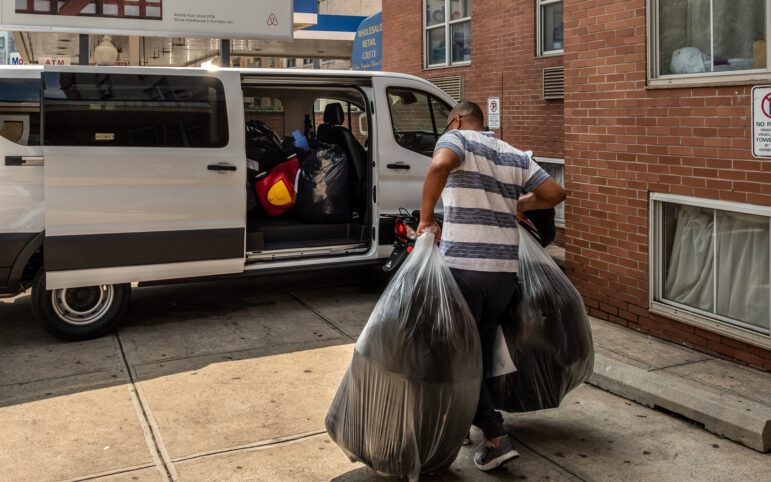
Adi Talwar
Possessions of migrant families who agreed to be relocated being loaded into a van outside an emergency shelter hotel in Queens.At lunchtime, families ordered pizza and shared slices in front of the hotel. Hours later, the school buses left. Mrs. Sanchez’s daughter arrived. Some families came down to the hotel lobby with black bags of their belongings stacked on top of each other. Six families voluntarily left the hotel on Friday afternoon, while others were still outside and did not want to leave.
Suset, who had been staying at the hotel for 11 months since arriving from the southern border, said she had called 311 to file a complaint about the transfers.
“How are they going to take us out overnight, as if we were just a bunch of junk?” she said.



